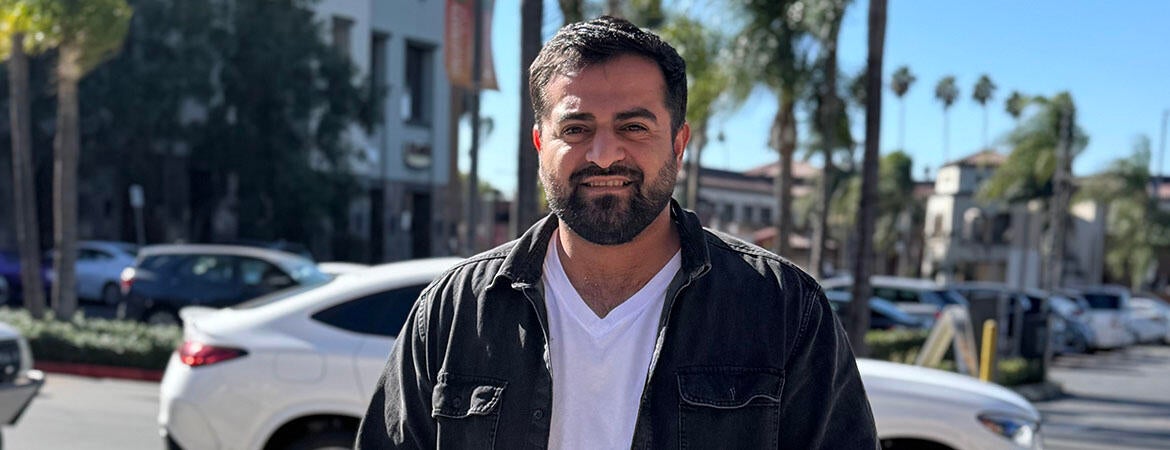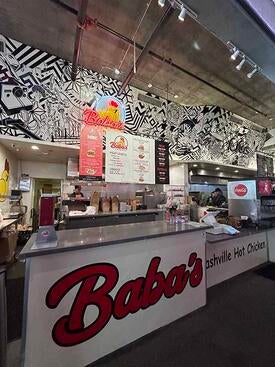
When asked when and why Mahmoud “Mike” Hemood ’20 created his Baba’s Hot Chicken restaurant, the answer begins well before it became a popular Riverside eatery:
“I started Baba’s on accident. There was no intention to start a brand, I was doing it purely for fun while I finished college. My very first sale was May 8, 2019, when I was selling sandwiches out of my apartment,” says Hemood, who earned a bachelor’s degree in business administration with an emphasis in accounting at the UCR School of Business.
Today, Baba’s brick-and-mortar is in the Riverside Food Lab—a food hall with many restaurants—on Market Street in the heart of the city’s cultural and dining district. The bright, casual diner is busy with customers who crave the spicy Nashville-style hot chicken sandwiches and choose varying heat levels: from no hot seasoning at all to an extreme fire punch: “intent to burn the victim’s mouth,” according to Baba’s menu.
“Most spicy food aficionados choose the hot option, which provides enough heat to satisfy any palate without causing pain. But a handful of customers each day opt for extreme heat,” says Hemood. “Among our staff, there’s an ongoing joke that you’re not officially an employee until you accidentally get extreme seasoning in your eyes.”
Hemood’s go-to order? “A Mini Baba, medium heat, no coleslaw, with cheese sauce and side of fries,” he says.
Born in Basra, Iraq, Hemood grew up in Fontana, California. The word “baba” is “father” in Arabic, and he says the moniker is a homage to his dad: “He sacrificed everything to ensure we had every opportunity in life.”
So, as a Californian with a lifelong interest in food who learned to cook via videos online, why did Hemood choose Nashville hot chicken?
“This is one of those ‘it chose me rather than I chose it’ situations,” says Hemood. “My dream has always been to open a high-end authentic Mexican restaurant, but Nashville hot chicken kind fell into my lap after I tried it in L.A. for the first time.” He has been selling his own version of the spicy sandwich ever since.
However, opening a restaurant is a notoriously risky business, especially as a small, one-man startup initially, and Baba’s experienced both openings and closings of other locations throughout Southern California. But Hemood stuck with his dream, paid close attention to each lesson of both triumph and failure, and with success now on the table in Riverside, he will be opening another Baba’s Hot Chicken in Redlands in the coming months.
We asked him about the journey from his apartment to Market Street, and he candidly shared his frontline experience—all the ups, downs, and in-betweens:
You fine-tuned your cooking by watching videos? Do you cook at Baba’s?
While I’m not formally trained as a chef, my passion for gastronomy runs deep. Growing up, I was captivated by Gordon Ramsay’s shows, which introduced me to his mentor, Marco Pierre White. Much of my home cooking is inspired by White’s style. I’ve honed my skills through countless videos on YouTube and Instagram, and by exploring recipes online. However, I rarely follow these recipes exactly. Instead, I prefer to understand the basic ingredients and then add my own twist to enhance the dish. I don’t do the cooking at Baba’s, but I’ve implemented systems to increase efficiency and reduce wait times while maintaining food quality.
Why did you choose the Riverside Food Lab as your restaurant location?
Originally, I launched the concept in Fontana and then moved to Rancho Cucamonga. My ultimate goal was to be part of the Riverside Food Lab. I made the decision after attending Downtown Partnership meetings and learned there were numerous growth opportunities, particularly for young entrepreneurs. So, I seized the opportunity.
How did you get the effort off the ground financially?
First off, I want to clarify that I do not recommend this approach unless you have a solid exit plan: Initially, I maxed out my credit cards, which had a limit of $3,000. I only bought the essentials—one tent, a small $80 fryer, a flat top grill, some coolers, and some miscellaneous utensils. After hosting my first few pop-ups, I generated enough income and invested in better equipment—more professional fryers and griddle.
When the Riverside Food Lab accepted my application, I was scrambling to find funding. Everyone I approached was hesitant and declined to offer financial assistance, often saying, “All restaurants fail.” However, a friend that I’ve known for 10 years who had extensive experience in the industry agreed to invest and mentor me. It’s probably his best investment to date.
You previously expanded to new locations but variously closed and sold those restaurants?
We did expand in 2021 to multiple locations—Bellflower, San Diego, Costa Mesa, and Bakersfield—which taught us many lessons and exposed numerous mistakes. The expansion phase, particularly during the COVID-19 pandemic, was fraught with new challenges almost daily, from local government regulations to supply chain disruptions and employment issues. By the end of 2023, it became clear that I needed to scale back and take some time to mentally regroup.
Our Bellflower and San Diego locations struggled with limited parking, so we heavily depended on foot traffic; although we managed decent revenue flows, the stress-to-reward ratio didn’t justify continuing operations there. Our Costa Mesa location performed exceptionally well, becoming our second highest-grossing store. About a year into operations, we were approached by another hot chicken brand offering a substantial sum to take over; given the difficulty in finding staff at the time, we decided to sell. Our Bakersfield location maintained consistent sales, but due to the distance and staffing challenges, we chose to sell this location, too.
It’s one thing to plan a restaurant and another to run it, and you also provide catering. What have you found to be most surprising, challenging, and rewarding about this venture and the talents needed to be an entrepreneur?
The initial phases of running any business are the most challenging. This often stems from not having established workflows, which means you’re generally reacting to immediate needs. For example, we would only prep items as they ran out, which caused delays during rush hours. Now, with a better understanding of our busier days, we can prepare adequately in the early hours to ensure we meet the demands of peak times.
One of the most surprising aspects in business is that professionalism is not as common as one might expect. When dealing with vendors and other entrepreneurs, I’ve found that it’s rare to encounter someone who embodies a traditional “professional” demeanor, and such individuals are often viewed negatively. For example, many of my vendors casually call me “bro” during conversations and engage in topics unrelated to business.
After nearly five years in business, I’ve come to believe the most critical skill one can possess is a strong personality and the ability to effectively communicate with others. Good people skills greatly increase your chances of achieving your goals. For example, the good rapport my current business partners and I have with our landlord enabled us to negotiate a reduction in our rent.
What’s next for Baba’s?
Our primary focus currently is on smart expansion, with a potential opening in Orange County in addition to Redlands. We now have a solid team in place, and we are in the process of preparing to franchise. It’s a long journey, but we are nearing completion. My role has been to develop all the systems, guides, and employee information, while my partners concentrate on the franchising.
How do you draw from your experience as a student at UCR’s School of Business?
I use the lessons from Lecturer Suryanarayanan Gurumurthi’s business course to streamline our processes, which is particularly relevant to the restaurant industry. I went home from his class during my pop-up days and immediately reorganized my equipment layout based on his teaching about human output, equipment placement, and availability of tools, all crucial to output time in the kitchen. This helped me also reduce the staff I needed in the kitchen from five or seven people to two or five people, depending on how busy we were.
Much of my branding and marketing knowledge came from Professor Sean Jasso’s courses. One example is that his emphasis on virality helped me get our content off the ground. There were lessons from my accounting and law courses that I didn’t apply immediately, but they’ve been immensely helpful over time as I interact with accountants and lawyers.
You still enjoy cooking at home. What else balances your life?
I’m really enjoying fatherhood and focusing on raising my children. I have a passion for cars and occasionally drive down Pacific Coast Highway with my friends or attend Cars & Coffee events. When I find the time, I still enjoy playing video games.
While I love being an entrepreneur, my experiences from 2019 to 2023 have taught me that there’s more to life than just money. So, I’m currently going with the flow, accepting what the universe sends my way while maintaining my peace.
